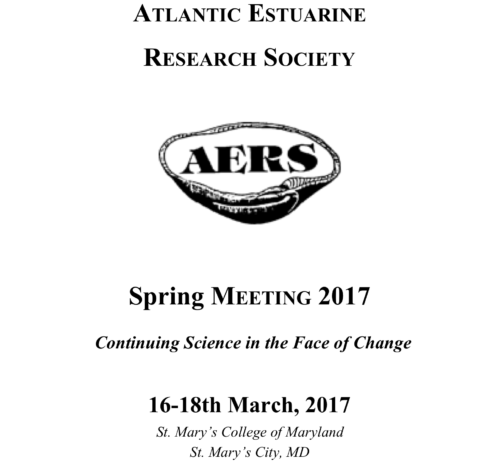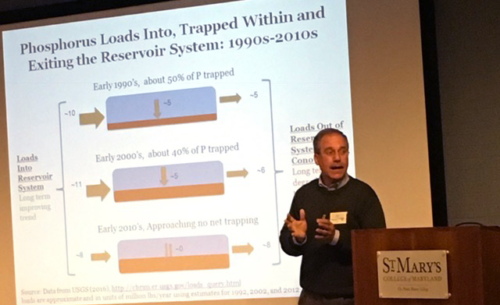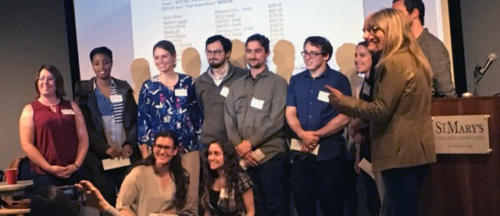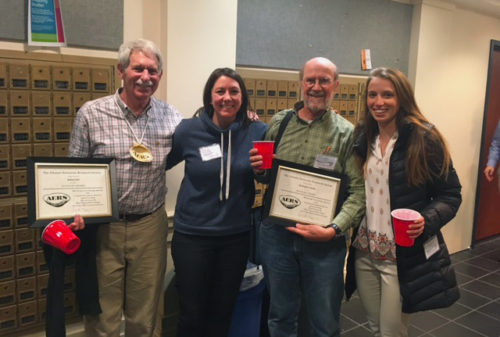Atlantic Estuarine Research Society meeting at St. Mary's College of Maryland
Bill Dennison · | Science Communication | 
The Atlantic Estuarine Research Society (AERS) meeting was held on 16-18 March 2017 at St. Mary's College of Maryland. AERS was the first scientific society focused on estuaries, formed in 1948. Other regional societies sprang up and a consortium of regional societies was formed, called the Estuarine Research Federation, formed in 1971 (later renamed Coastal and Estuarine Research Federation). AERS meetings are small and informal, with many students presenting their first scientific presentation or poster. Another feature of AERS meetings is that they are fun, with multiple social gatherings. This AERS meeting was no exception. The opening reception was held in the River House of St. Mary's College, with abundant beer and delicious local oysters provided by Shore Thing Shellfish. I particularly enjoyed meeting Sheldon and Brian Russell who were shucking oysters as fast as we could eat them (note, Bill Ball from the Chesapeake Research Consortium and I consumed several dozen just by ourselves).
The keynote speakers were Beth McGee (Chesapeake Bay Foundation), Kenny Rose (currently Louisiana State University, but moving to the University of Maryland Center for Environmental Science soon) and Nick DiPasquale (Chesapeake Bay Program). Rich Batiuk from the Chesapeake Bay Program also presented an update on Chesapeake science and management.

AERS gave out several awards, including the Lifetime Membership Award for senior scientists. This year's recipients were Chris Tanner and Bob Paul from St. Mary's College of Maryland, and Walter Boynton from the University of Maryland Center for Environmental Science. Walter told a hilarious story about his first scientific talk at an AERS conference. After Walter finished his career-first presentation, he stepped back from the podium and proceeded to fall off the stage, disappearing from view. Both Walter and the audience were rendered speechless until Walter's face appeared above the edge of the stage. Needless to say there were no questions, which Walter considered an advantage at that point in his career.

One of the attributes of AERS that I appreciate is that the society makes a point of fully involving students, including advanced undergraduates and graduate students. AERS provides travel awards to students and also gives awards to best student presentations and best posters. Students are provided with a resume boot camp and given an opportunity to have lunch with the plenary speakers. The poster session is mostly populated with student posters, and is well attended (and well lubricated). One of the undergraduate presentations was by Elizabeth Dennison, who presented her St. Mary's Project (Biology Department capstone senior thesis). Elizabeth appeared quite poised and knowledgeable, but speaking from personal experience, her parents were quite nervous for her. My long term colleague Veronica Berounsky from the University of Rhode Island Graduate School of Oceanography was in the same boat as her son Ben Lee, also a senior at St. Mary's, presented his first poster at this conference.

Hilary Neckles, the President-Elect of Coastal Estuarine Research Federation (CERF), attended the conference and highlighted the activities of the parent organization of AERS. One of these activities is a new webinar series. I am scheduled to present a webinar in this series entitled "Tell a compelling story: Combining killer graphics and good narrative for effective science communication" in September. The biennial CERF meeting will be held 5-9 Nov 2017 in Providence, Rhode Island. CERF meetings are one of my favorite scientific gatherings, largely because of the regular attendance of excellent scientific colleagues and resource managers who work on coastal issues. It is nice to see that CERF has grown into an international scientific society since its beginnings with AERS, yet AERS remains a vibrant society as exemplified by this spring meeting.
About the author
Bill Dennison

Dr. Bill Dennison is a Professor of Marine Science and Vice President for Science Application at the University of Maryland Center for Environmental Science.